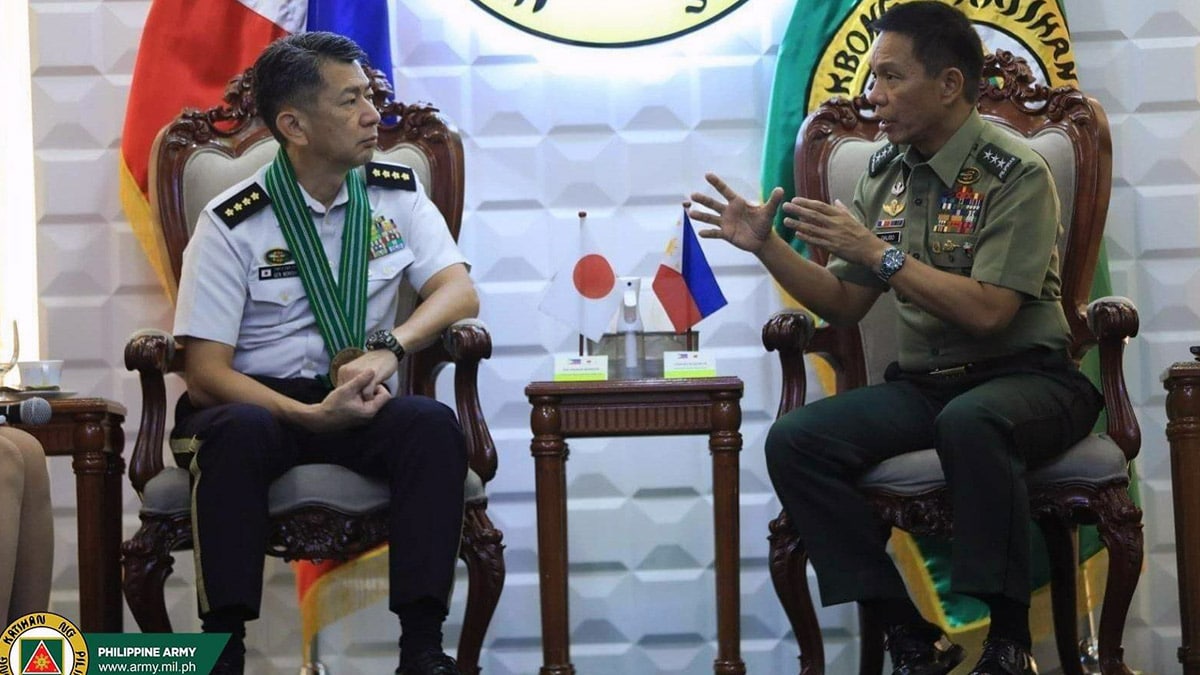
Japan Ground Self-Defense Force chief of staff Gen. Yasunori Morishita pays a courtesy on Philippine Army chief Lt. Gen. Roy Galido at Fort Bonifacio, Taguig City on Sept. 2. OACPA
MANILA, Philippines — The army chiefs of the Philippines and Japan on Monday discussed future exercises ahead of their bilateral and multilateral cooperation as security ties of both countries are expected to deepen in the coming years after signing a significant military access deal, the Philippine Army said.
Among the topics discussed by Philippine Army chief Lt. Gen. Roy Galido and his Japanese counterpart, Japan Ground Self-Defense Force (JGSDF) Gen. Yasunori Morishita, were the Exercise Balikatan, the biggest military drills between the Philippines and US; the Exercise Salaknib, the biggest joint drills between the Philippine and US armies; and Exercise Yama Sakura, the annual command post exercise between the JGSDF and US Army, the Philippine Army said.
The JGSDF is the land warfare unit of the Japanese Self-Defense Forces.
READ: PH, Japan ink defense pact amid China aggression
Morishita also paid a visit to Philippine Marine Corps (PMC) commandant Maj. Gen. Arturo Rojas later in the day, where they discussed “necessary coordination between JGDSF and PMC, highlighting the importance of mutual cooperation and collaboration,” the PMC said.
The top Japanese army official is in Manila to exchange ideas with his counterparts on how to “advance joint efforts in boosting a free and open Indo-Pacific,” Japanese ambassador to Manila Kazuya Endo said on X (formerly Twitter).
Tokyo’s security cooperation with Manila is expected to boost in the coming years after the two countries signed a reciprocal access agreement (RAA) in July, allowing their troops and equipment on each other’s territory for combat training and disaster response. The RAA will take effect once ratified by the Philippine Senate and the Japanese Parliament.
The Philippines has similar deals with the United States and Australia, also among Japan’s closest security partners.
Actual participants
Armed Forces of the Philippines chief Gen. Romeo Brawner Jr. said in a news conference last week they are hoping the access deal with Japan will be ratified before the start of large-scale military exercises next year “so that they could join us not as just observers but actual participants.”
Both Manila and Tokyo have territorial disputes with China, with Manila facing Beijing’s excessive claims on almost the entire South China Sea. Tokyo is dealing with China’s repeated incursions into the Japanese-administered Senkaku Islands in the East China Sea.
Representatives from Japan and Australia joined for the first time the side events at the high-level meeting of Philippine and US military— the Mutual Defense Board and Security Engagement Board— held in Baguio City last week, according to a government source.
Endo represented Tokyo, while Canberra also sent representatives from the embassy for an “unclassified session,” a part of the MDB-SEB event but not the actual discussions between the two allies.
In May, the defense ministers of the four nations committed to boost security partnerships to keep the peace and stability in the region amid China’s growing aggressiveness. A month prior, the navies of the four countries made their historic quadrilateral joint sail in the West Philippine Sea, part of the Philippines’ exclusive economic zone in the South China Sea, where China has sweeping claims.
A 2016 arbitral ruling voided those expansive claims but Beijing has refused to recognize the decision.